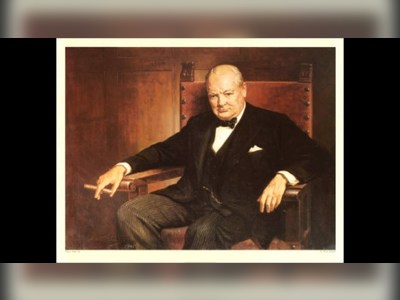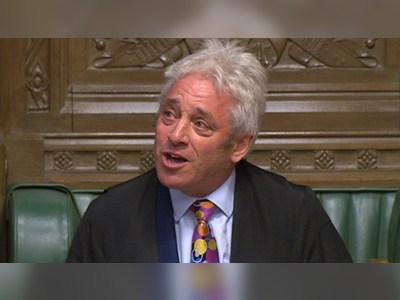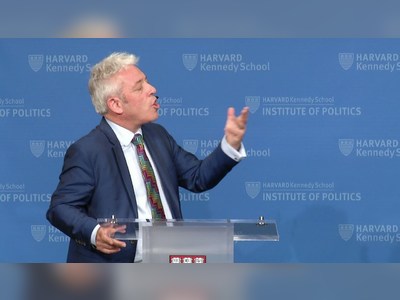British Heritage
Remember, Cherish, Learn.
beta
Tony Blair - The Future of Britain in an Era of the Three Revolutions, Jan 2022
Navigating the Future in the Age of Three Revolutions.
Tony Blair, the former Prime Minister of Great Britain and Northern Ireland, has made a lasting impact on the British heritage. His influence extends beyond the realm of politics into the realms of socio-economic discourse, global engagement, and most importantly, through his continued leadership in the public sphere. His insightful understanding of contemporary issues, particularly the challenges posed by three current revolutions: Brexit, technology, and climate change, signifies the crucial relevance of his voice in the contemporary political landscape of Britain.
Blair’s political prowess and intellectual capacity allowed him to drive transformative changes in Britain during his tenure as Prime Minister. His reformative policies were instrumental in revitalising British society and economy, with initiatives centred on social justice, robust healthcare, and a globally competitive economy. His commitment to public service remains unbroken even after leaving office, through his roles such as the Executive Chairman of the Tony Blair Institute for Global Change.
On 20th January 2022, Blair demonstrated his unwavering commitment to Britain's future in a keynote address on the "Future of Britain in an Era of the Three Revolutions". It was a masterclass in rhetoric, highlighting the dire necessity for new ideas to navigate the turbulence caused by Brexit, the technology revolution, and the ambition for climate neutrality. This address marked a vital juncture in Blair's legacy, as he once again emerged as a vital commentator on Britain's challenges and opportunities, not offering mere solutions but a comprehensive framework for change.
In his speech, Blair identified three seismic shifts that Britain is currently experiencing. Firstly, Brexit has altered Britain's political and economic landscape in significant ways. As he noted, the debate over Brexit's wisdom has concluded, but the consequences of this decision are becoming increasingly apparent. Trade relations with Europe, the cost of exiting the single market, and the uncertainty faced by businesses signal that Britain's political leadership needs to chart a new course post-Brexit.
Secondly, Blair highlighted the technology revolution as the most impactful of the three. As AI advances and entire sectors of the economy face disruption, Blair underlined the urgent need for policymakers to consider the opportunities that technology presents. The digital revolution can change the way we teach, learn, and structure services like the NHS, but this requires strategic planning and informed decisions.
Finally, the climate change ambitions have set Britain on a path towards becoming carbon-neutral by 2050. This will require extensive changes, including doubling electricity supply, replacing heating systems, boosting renewables, and reforming electricity markets.
While identifying these revolutions, Blair also underscored the dire consequences of an inadequate response. For Britain to successfully navigate these changes, Blair proposed a radical shift in policy and a restructuring of government. He called for coherence in policy formulation, ensuring that the actions in one area do not undermine the objectives in another.
Blair suggested that Britain's political debate needs to move beyond the left-right ideological divides, which have lost their relevance in the 21st century. He argued that the challenges posed by the three revolutions are more complex and demanding than any experienced during the Thatcher era or under New Labour. Addressing these will require long-term, sustainable plans and the ability to work across traditional party lines.
To this end, Blair proposed two initiatives: a series of papers and seminars to be presented by his Institute, and a conference organized by the cross-party group 'The Britain Project'. Both these initiatives aim to facilitate a comprehensive and inclusive dialogue on the future of Britain.
Blair's insights into the complexities of Brexit, technology, and climate change, as well as his call for a radical policy shift, demonstrate his continued influence on British heritage and his commitment to the nation's future. His recognition of the gravity of these issues and the importance of inclusive dialogue is a testament to his ability to lead and inspire.
Despite leaving the prime minister's office, Blair continues to shape British politics, contributing to the heritage of the nation with his intellect, passion, and unwavering commitment to public service. As Britain navigates the complexities of the 21st century, Blair's influence will remain a guiding force, inspiring policymakers and the public alike.
In conclusion, Tony Blair's legacy extends beyond his time as Prime Minister and continues to influence contemporary British politics. His insightful analysis of the challenges posed by Brexit, technology, and climate change, coupled with his proposed solutions, illustrates his enduring contribution to the British heritage. As Britain grapples with these complex issues, Blair's thought leadership will remain a valuable asset, guiding the nation towards a prosperous and sustainable future.
Blair's Legacy: An Indelible Mark on British Heritage
Blair’s political prowess and intellectual capacity allowed him to drive transformative changes in Britain during his tenure as Prime Minister. His reformative policies were instrumental in revitalising British society and economy, with initiatives centred on social justice, robust healthcare, and a globally competitive economy. His commitment to public service remains unbroken even after leaving office, through his roles such as the Executive Chairman of the Tony Blair Institute for Global Change.
On 20th January 2022, Blair demonstrated his unwavering commitment to Britain's future in a keynote address on the "Future of Britain in an Era of the Three Revolutions". It was a masterclass in rhetoric, highlighting the dire necessity for new ideas to navigate the turbulence caused by Brexit, the technology revolution, and the ambition for climate neutrality. This address marked a vital juncture in Blair's legacy, as he once again emerged as a vital commentator on Britain's challenges and opportunities, not offering mere solutions but a comprehensive framework for change.
Blair's View: The Three Revolutions and Their Impact on Britain
In his speech, Blair identified three seismic shifts that Britain is currently experiencing. Firstly, Brexit has altered Britain's political and economic landscape in significant ways. As he noted, the debate over Brexit's wisdom has concluded, but the consequences of this decision are becoming increasingly apparent. Trade relations with Europe, the cost of exiting the single market, and the uncertainty faced by businesses signal that Britain's political leadership needs to chart a new course post-Brexit.
Secondly, Blair highlighted the technology revolution as the most impactful of the three. As AI advances and entire sectors of the economy face disruption, Blair underlined the urgent need for policymakers to consider the opportunities that technology presents. The digital revolution can change the way we teach, learn, and structure services like the NHS, but this requires strategic planning and informed decisions.
Finally, the climate change ambitions have set Britain on a path towards becoming carbon-neutral by 2050. This will require extensive changes, including doubling electricity supply, replacing heating systems, boosting renewables, and reforming electricity markets.
Navigating The Three Revolutions: A Call for Policy Revamp
While identifying these revolutions, Blair also underscored the dire consequences of an inadequate response. For Britain to successfully navigate these changes, Blair proposed a radical shift in policy and a restructuring of government. He called for coherence in policy formulation, ensuring that the actions in one area do not undermine the objectives in another.
Blair suggested that Britain's political debate needs to move beyond the left-right ideological divides, which have lost their relevance in the 21st century. He argued that the challenges posed by the three revolutions are more complex and demanding than any experienced during the Thatcher era or under New Labour. Addressing these will require long-term, sustainable plans and the ability to work across traditional party lines.
To this end, Blair proposed two initiatives: a series of papers and seminars to be presented by his Institute, and a conference organized by the cross-party group 'The Britain Project'. Both these initiatives aim to facilitate a comprehensive and inclusive dialogue on the future of Britain.
Towards A Prosperous Future: Blair's Continued Influence on Britain
Blair's insights into the complexities of Brexit, technology, and climate change, as well as his call for a radical policy shift, demonstrate his continued influence on British heritage and his commitment to the nation's future. His recognition of the gravity of these issues and the importance of inclusive dialogue is a testament to his ability to lead and inspire.
Despite leaving the prime minister's office, Blair continues to shape British politics, contributing to the heritage of the nation with his intellect, passion, and unwavering commitment to public service. As Britain navigates the complexities of the 21st century, Blair's influence will remain a guiding force, inspiring policymakers and the public alike.
In conclusion, Tony Blair's legacy extends beyond his time as Prime Minister and continues to influence contemporary British politics. His insightful analysis of the challenges posed by Brexit, technology, and climate change, coupled with his proposed solutions, illustrates his enduring contribution to the British heritage. As Britain grapples with these complex issues, Blair's thought leadership will remain a valuable asset, guiding the nation towards a prosperous and sustainable future.




